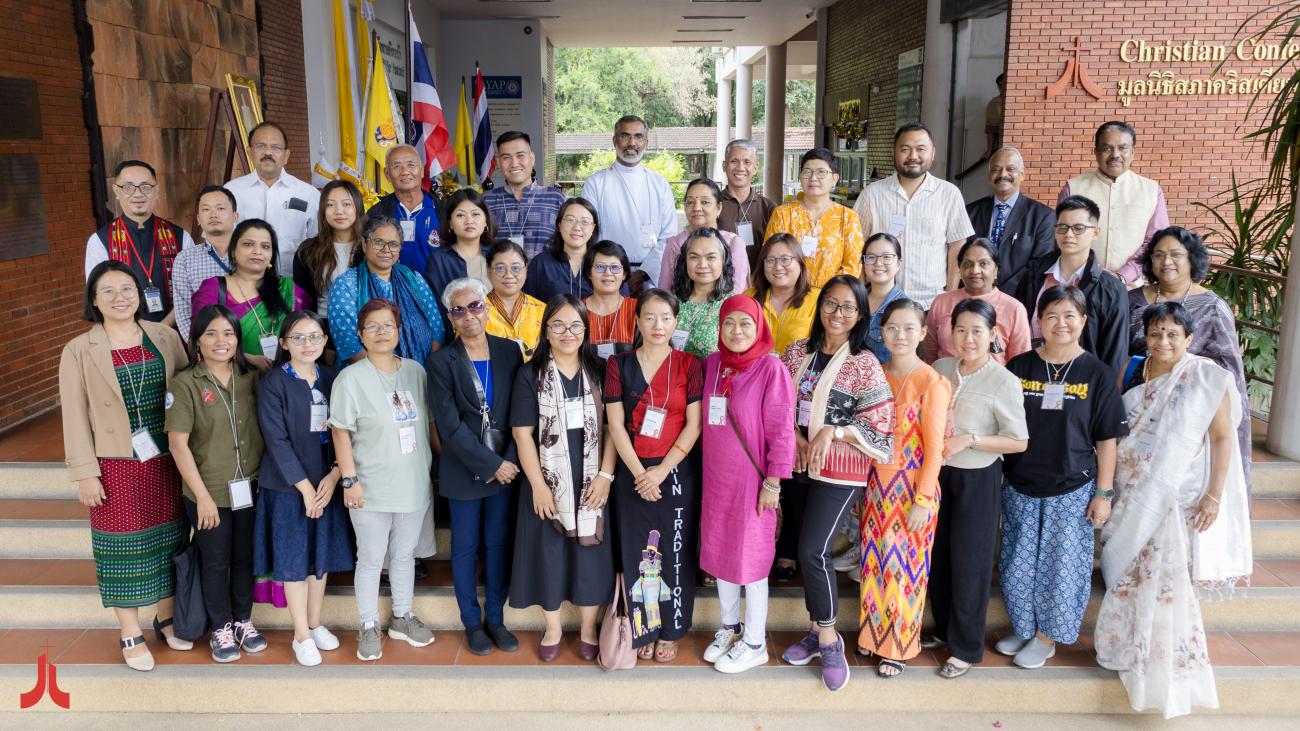Asia regional consultation addresses strengthened focus on children's rights and healthcare access

Participants of Regional Consultation on
‘Towards Enhancing Social Protection Measures for HIV Affected Children and Teens in Asia'
Chiang Mai, Thailand: The Asia regional consultation on ‘Towards Enhancing Social Protection Measures for HIV-Affected Children and Teens in Asia’, organised by the Christian Conference of Asia (CCA) as part of the Action Together in Combating HIV and AIDS in Asia (ATCHAA) initiative, underscored the urgent need for inclusive policies, community-driven solutions, and sustained advocacy to support HIV-affected children, teens, and other vulnerable groups.
Held from 29 November to 1 December 2024, at the CCA headquarters in Chiang Mai, Thailand, the three-day consultation brought together over 46 participants—including medical professionals, social activists, community health workers, members of PLHIV networks, and representatives from faith-based organisations. The consultation focused on addressing systemic barriers, stigma, and inequalities while advocating for equitable healthcare and support for children and teens in the region.
Discussions during the first two days of the consultation emphasised the significance of child-friendly interventions, faith-based advocacy, and addressing gender inequality, along with the specific needs of marginalised communities. Participants explored actionable steps to reduce stigma, enhance healthcare access, and promote social justice.
The first day featured a plenary session on ‘Challenges and Best Practices in HIV Treatment Access and Adherence for Children and Teens’, with speakers sharing insights from diverse initiatives across Asia.
Dr Ronald Lalthanmawia, ATCHAA Programme Coordinator, opened the consultation by highlighting the neglect of children in the Asia-Pacific region’s HIV response. He stressed that discriminatory laws and social inequalities remain major obstacles to treatment access, hindering efforts to reduce HIV in the region.
Lucy Remruati Chhangte of Gan Sabra, Mizoram, India, highlighted the vulnerability of young children affected by HIV, worsened by poverty, substance abuse, and lack of awareness. She emphasised the importance of age-appropriate counselling and child-friendly healthcare services.
Highlighting the societal taboos and stigma that hinder interventions for vulnerable children, including those affected by sex trafficking, Carina Teola Sajonia from Mindanao, Philippines, advocated for the participation of children in HIV strategies.
Berlina Sibagariang, from AIDS Ministry of Huria Kristen Batak Protestan, Indonesia, shared a community-based care model focusing on family support, nutrition, routine health check-ups, and skills training. She called for stronger government and societal support to amplify these efforts.
In her address focusing on challenges, including parental neglect and discrimination, Elizabeth Thomas from Penang, Malaysia pointed out the lack of access to affordable treatment for non-Malaysian children and emphasised the need for institutional and societal reforms to support children living with HIV.
On the second day, Rebecca Ang from Malaysian Care and Piangta Chumnoi from the Baanjingjai Foundation, Thailand, shared insights from their work in the field in their respective countries on ‘Preventing HIV Among Teens and Securing Their Future’.
During the panel on ‘Imperative to Enhance Social Protection and Rights for Children and Teens Affected by HIV in Asia’, Dr Glory Alexander, Director of the ASHA Foundation in Bengaluru, India, shared experiences of working with HIV-affected women and children in India, particularly in areas related to holistic care, testing, treatment, psycho-social support, housing, nutrition, and prevention of mother-to-child transmission.
Candice Ann Cindy Abraham Sering, from the Salinlahi Alliance for Children’s Concerns in the Philippines provided a cross-sectional view of the challenges faced, particularly by vulnerable children. Ms Sering highlighted the aspirations of HIV-affected children and teens, emphasising their role as changemakers. They proposed youth seminars, safe sex forums, and workshops to promote HIV awareness and combat discrimination.
Rosiana Indah Purnomo of the Communion of Churches in Indonesia (PGI) stressed the importance of child-friendly programmes within churches to support children living with HIV and called for inclusive HIV policies that ensure children’s rights to education, healthcare, and protection from stigma.
Ms Purnomo urged churches to take a proactive role in advocacy, integrate Biblical perspectives into sermons, create safe spaces, and support stronger child-focused policies, alongside training for church leaders and the development of care communities for sustained support.
Programme Executive for the World Council of Churches (WCC) Ecumenical AIDS Initiatives and Advocacy Programme, Gracia Violeta Ross Quiroga, said, “In WCC, our efforts are focused on closing the gap between church leadership and the children and youth in the church, ensuring we listen to them rather than merely giving instructions”.
Ms Quiroga emphasised the importance of standing in solidarity with their needs and fostering understanding, empowering the children and youth, and strengthening their sense of belonging within the church.
During the panel presentation on ‘Gender Justice and Asian Realities: Responding to Vulnerable Situations’, Michael Jesus A. Mahinay, of ALAGAD, Mindanao in the Philippines highlighted the country's HIV epidemic, predominantly affecting MSM and transgender women, with youth driving new infections. He discussed ongoing challenges, such as late diagnosis and delays in treatment initiation, while outlining steps taken to combat the epidemic. He also noted the growing number of treatment hubs and primary HIV care facilities, which have strengthened the Philippines’ response to the crisis.
Yuyum Fhahni Paryani from Indonesia highlighted the ongoing challenges of gender inequality, including systemic discrimination, economic disadvantage, and limited access to rights in the Indonesian context. She examined ASEAN’s commitments, such as the ASEAN Gender Mainstreaming Strategic Framework, noting persistent gaps like wage inequality, underrepresentation of women in leadership, and online harassment in the region.
Dr Rajni Herman of Shalom Delhi, India, highlighted the critical role of palliative care in addressing the needs of transgender women, particularly those living with HIV. Drawing from years of experience and real-life stories, she shed light on the struggles of India’s ‘poor, broken and marginalised’, who are often stigmatised and overlooked.
The consultation will conclude on 1 December 2024.
For photos of Day 2, please click here (photo gallery)










